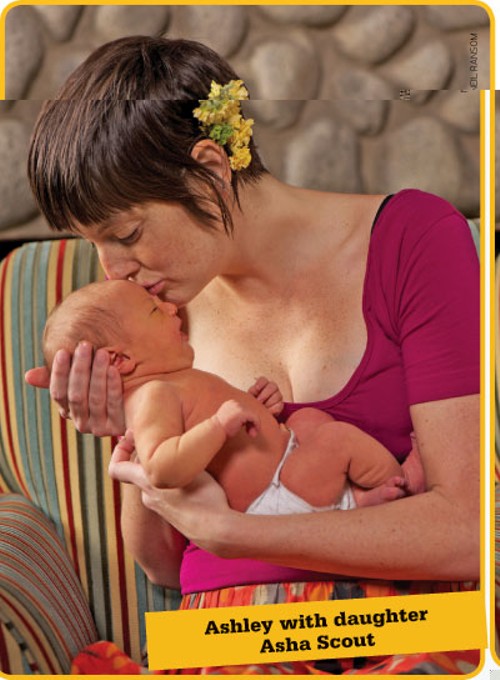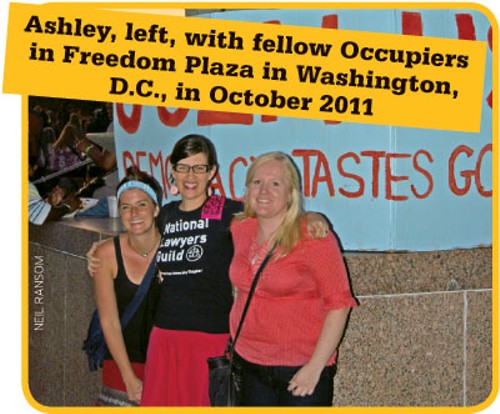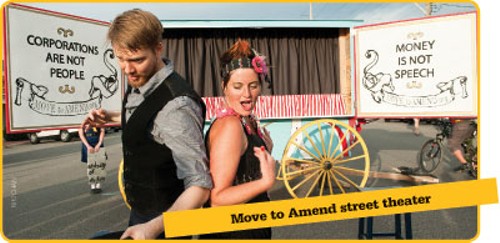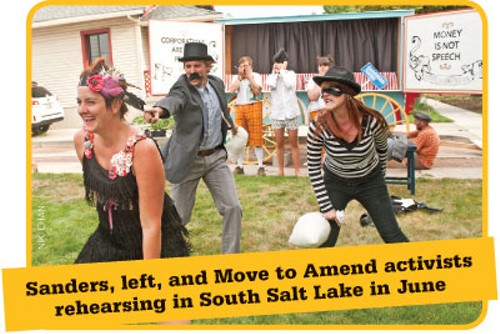Page 3 of 3
Even as Sanders learned so much, she recalls, about “real organizing for the first time in my life, strategizing and thinking,” she also struggled with how DU members viewed her Mormon past.
Cobb says that while her political values dovetailed with DU, what he learned about the Mormon faith came from watching South Park. “I was actually shocked that that parody was real,” he says. Nevertheless, the “Mormon notion of community and organized structure, that’s brilliant,” he says, and he and Sanders discussed how to mesh a Mormon style of organizing with DU’s structure.
“Activism is a constant dance, where you’re trying to care without destroying yourself,” Sanders says. While Democracy Unlimited was one of the best experiences of her life, she says it was also “a place of extreme mental and emotional duress.” Like many Mormons she has talked to, she found that her late 20s, rather than her teens, were her “coming of age,” she says. “It was like I was re-engineering my brain. I didn’t know what parts to choose and which parts to discard.”
She was in love with an activist, but the relationship ended badly. “I was having an awful time emotionally, experiencing burnout. I felt so confused about who I was, insecure, so depressed, so sad. I felt there was no hope in ever simplifying things.”
Walking on the beach with a co-worker as he criticized Mormons for being racist and sexist, she felt so torn. “I agreed, but I also knew it was far more complex than that, it wasn’t that easy.” She realized that after months of struggling to reconcile her former faith, her politics and the attitudes of DU members, “my brain was maxed out.” She turned on the bath tap, and for 10 minutes held her head under the gushing water. “It was too much for me; it was too much of the new for me. I had no idea what to do. I was trying to flush my brain; I wanted a new brain.”
HARD CHOICES
After eight months, Sanders left Democracy Unlimited for Salt Lake City. On a road trip back from Humboldt County with her friends, Sanders celebrated her birthday. She raised her glass for a toast. “Here’s to my 28th. It can’t be as bad as the 27th.”
While out in the city preparing a scavenger hunt for her mother’s birthday, she met someone she describes as a tattooed ex-Mormon, with whom she eventually had a short relationship that resulted in an unplanned pregnancy. She knew she couldn’t raise a child herself. “I’d be a great co-mom,” she thought. “But making three meals a day, figuring out clothes to wear—I can’t even do that for myself.”
She decided to look for adoptive parents. She wanted the adoption to be open, effectively breaking down the idea of the nuclear family by merging herself and the child with another family. That meant she would get to know on a personal level each of the couples she short-listed. “I did it the hard, messy way I always do it.” Her list came down to two. One was a woman very much like herself, the other a North Carolina couple, Emily and Jon, who are devout Mormons.
She chose the orthodox LDS family, a decision that left her confused. “They were the right people, it was the right decision, yet I was opening up a door in my life I’d thought I’d closed,” she says. She describes them as “sweet angels,” demonstrating a kind of love-centric Mormonism that reminded her of her own mother.
Just one month after Sanders decided that Emily and Jon would adopt her baby, her water broke three weeks early. In the peaceful chaos of her parents’ home, her brother inflated the plastic birthing tub, while others heated up pots of water. Sanders gave birth at 4 p.m. after four hours of labor.
Sanders took five days to be with her baby before she handed her over to Emily and Jon. “For those days, my only focus was being with the people I loved, meeting my emotional needs, feeding and caring for a baby.” Where once her to-do list was “to end capitalism, those days it was to hug this person, to give this person food.” She felt truly content. “It was a brand-new feeling for me.”
Minutes before the hand-over, she wept in the shower. She didn’t know how to walk out of the bedroom and “hand this being over to another person.” All she could do was brace herself. When the co-parents left with her baby, “I was terrified for my life, afraid of the harshness, of going back to face all these unslayable dragons.”
Sanders had grown very close to her midwife through the pregnancy and birth. She had long sought a champion, and in Brianna Blackwelder she found that person. But four months after the birth, Blackwelder was killed in a car crash. Sanders was devastated. “It just really made all my plans go ‘poof’ for a while.” At the funeral, she read out an eloquent farewell: “You taught me this: that life is learning to believe what we say to other people, and to have the bravery to admit when we don’t.”
She quickly faced her first challenge as a co-parent when Emily and Jon told her they wanted to name the baby Asha Elizabeth, Asha being both Sanskrit for hope and an echo of Sanders’ first name.
But Sanders had already named their baby. “I named her Scout for an important reason,” Sanders says. “I wanted her to be an intrepid spirit, a trailblazer. Her name came out of the sorrow of that experience.” It was, she acknowledges, “the first test of making a decision as a weird kind of family.”
In the end, they agreed on Asha Scout. “To me it represents a cool collaboration. We’re doing what people said was impossible.”
PARTY GIRL
In the run-up to activist Tim DeChristopher’s federal-court sentencing on July 26, 2011, on two felonies related to his false bidding on oil and gas leases in a Bureau of Land Management auction, Sanders stepped up her involvement with Peaceful Uprising, which had begun in 2009. DeChristopher, she says, “was a spark that lit a fire in a lot of people that we had never seen before.” He demonstrated, she says, that activists should have “an almost unbearable level of self-trust.”
After DeChristopher was sentenced to two years in prison, Sanders was among 26 protesters arrested for blocking the downtown TRAX light-rail transportation system.
Rocky Anderson questions the effectiveness and results of such actions. “I especially think we should try not to alienate those who ought to be on our same side and with whom we share fundamental values,” he says. Blocking the light rail, he argues, didn’t endear “many people to the cause.”
On Sept. 17, 2011, Occupy Wall Street burst onto the front pages when it took over Zuccotti Park in New York City. “I’d been waiting my whole life an as activist, and then this explosion,” she recalls. “Yes!” Sanders and Ashley Anderson, on behalf of Peaceful Uprising, went to the Washington, D.C., Occupy gathering in Freedom Plaza.
Sanders was in charge of street theater, she says, “doing creative action stuff,” like having a truth-telling tent where people could vent about their lives on the record. She also organized an all-night dance party, where participants “were sweating, whooping and hollering.” It was just one of those moments, she says she thought, “This is what I do this for.”
“A GORGEOUS WORLD”
In a speech Sanders gave on the steps of the Salt Lake City & County building in May 2012, the Move to Amend national executive committee member and Salt Lake City founder and coordinator told the press that she had a rare victory to inform them of, namely that in 60 days, 150 volunteers had secured 11,140 signatures for a petition calling for the end of corporations being given personhood status in the U.S. Constitution. To celebrate, she organized a giant roller-skating party. “Old people, young people and kids were roller-skating for four hours. I know we just barely started, but we had actually succeeded. It was such a great feeling to have a concrete success.”
But such success, however, proved somewhat muted when Salt Lake City Attorney Ed Rutan questioned the legality of their petition’s form. The Salt Lake City Council plans to review in July whether the resolution makes it onto the November ballot.
Whatever the fate of the ballot initiative, on the personal front, Sanders has found happiness with a girlfriend with whom she runs Move to Amend’s street theater program. “I’m happier than I’ve ever been in my life,” she says about the relationship. “It’s so much more equal.”
That activist collaboration came to a head that early June night when Move to Amend premiered its wagon-borne street theater. As the small convoy bracketing the group of people in costumes running alongside the wagon makes its way through the dusk-blushed streets to the Granary District, children stop and wave, people honk their horns, adults smile.
Sanders is in her element, dancing, overacting, sharing, along with her troupe, her critique of corporate rule with a crowd of 50 or so, many of whom seem already in agreement. “Our wagon broke on the way over, but we’re fine now,” she says. Here, it seems, is the distillation of her universe, bringing politics and theater, costumes and fun, and Sander’s unique talents together, she says, “to make a gorgeous world.”
More by Stephen Dark
-
Call it a Comeback
Long mired in economic depression, Midvale’s Main Street dusts off its small-town charm.
- Sep 20, 2017
-
Love Letters
Correspondence between a young woman at the Topaz internment camp and her beloved sheds light on Trump's America.
- Sep 6, 2017
-
Triggered
Veterans Affairs exists to help vets. So why did the Salt Lake VA appoint an anti-veteran chief?
- Aug 30, 2017
- More »
Latest in Cover Story
Readers also liked…
-
Forget the family pedigree—Robert F. Kennedy Jr should not be the next president of the United States
Trojan Horse
- Jun 21, 2023
-
Women decry harassment and toxic culture at St. George auto dealership
Men at Work
- Oct 11, 2023








